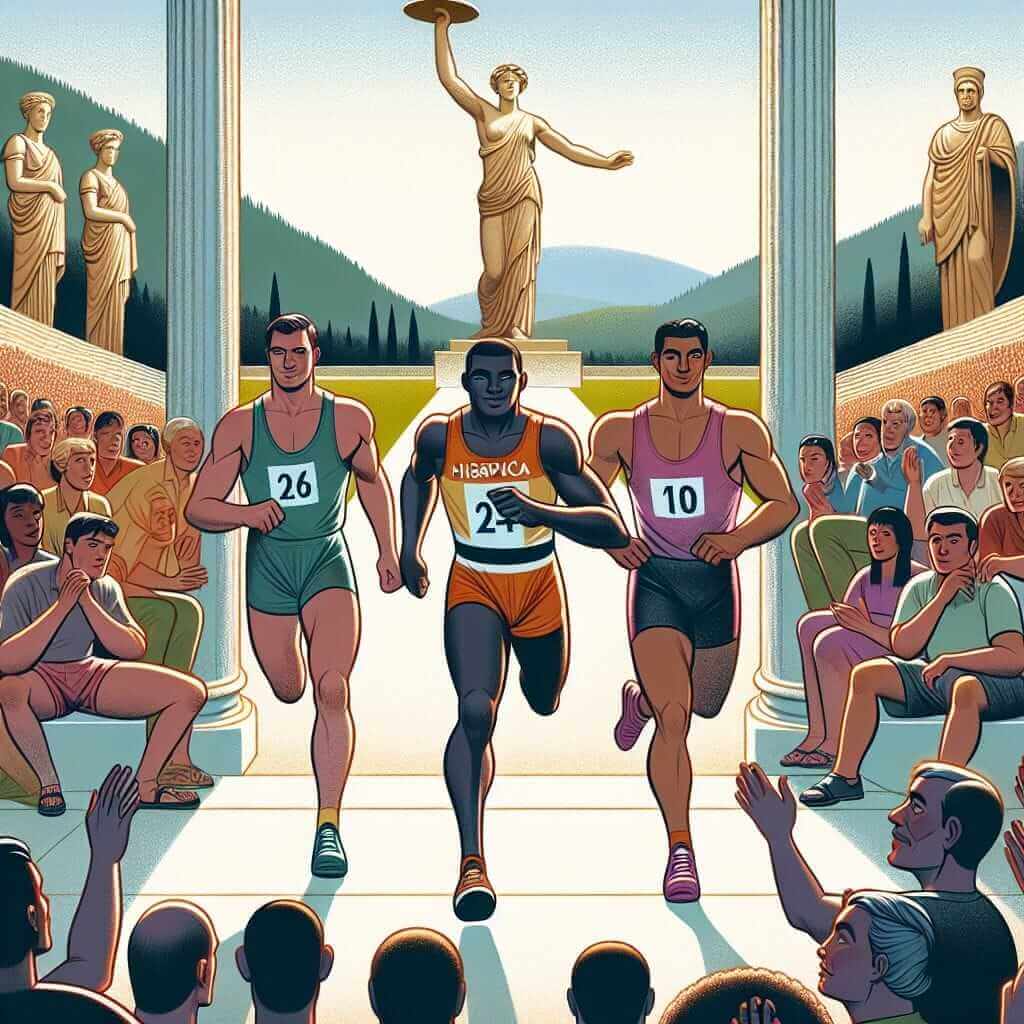Understanding the historical significance of ancient sports gives us insights into the values, beliefs, and social structures of past civilizations. In the IELTS Reading section, this topic can provide a rich source of information for practice. Let’s delve into the importance of ancient sports and examine why they were essential to various cultures.
IELTS Reading tests frequently include passages on history and society, including diverse subjects from ancient civilizations to modern developments. Ancient sports, being a part of human history, have appeared in past IELTS exams and may likely do so again, given their interdisciplinary relevance.
Reading Passage
Historical Significance of Ancient Sports
The role of sports in ancient societies was pivotal, not only as a form of entertainment but also as a means of social cohesion and religious observance. Sports were deeply embedded in the cultural fabric and significant epochs of civilizations like Greece, Rome, and Egypt.
The Greeks and the Olympic Games
Ancient Greece is perhaps the most well-known for its contribution towards organized sports through the Olympic Games. Established around 776 BC, the Olympics were held in Olympia and featured a wide range of athletic competitions such as running, wrestling, and chariot racing. These games were not merely physical contests but also religious festivals held to honor Zeus, the king of the Greek gods. Participation in the games was considered a tribute to the deity, and winners were regarded as heroes.
Roman Gladiatorial Contests
In stark contrast to the Greek ideals, Roman sports, particularly the gladiatorial contests, were brutal affairs designed to demonstrate the power and control of the Roman Empire. Gladiators, often slaves or prisoners of war, fought in arenas like the Colosseum for the entertainment of the masses. These events were a display of strength, endurance, and military prowess, reinforcing Rome’s dominance and providing a distraction from the hardships of daily life.
Athletic Events in Ancient Egypt
Ancient Egypt placed significant emphasis on physical fitness, as evidenced by tomb paintings and hieroglyphics depicting sporting activities such as archery, swimming, and ball games. Pharaohs often sponsored sports to display their power and superiority. These activities were not only recreational but also held religious and ceremonial importance, symbolizing the eternal struggle against chaos.
Practice Questions
Multiple Choice
-
According to the passage, why were the Olympic Games held?
a) To honor Zeus
b) To demonstrate military prowess
c) To entertain the masses
d) To show the power of Pharaohs -
Which civilization is known for brutal gladiatorial contests?
a) Greece
b) Rome
c) Egypt
d) Persia
True/False/Not Given
- The Olympic Games featured chariot racing. (True/False/Not Given)
- Roman gladiatorial contests were primarily for religious purposes. (True/False/Not Given)
- Pharaohs in Ancient Egypt participated in sports themselves. (True/False/Not Given)
Matching Information
Match the information to the corresponding civilization:
-
Held religious and ceremonial significance
- A) Greece
- B) Rome
- C) Egypt
-
Demonstrated power through brutal sports
- A) Greece
- B) Rome
- C) Egypt
-
Featured a variety of athletic competitions
- A) Greece
- B) Rome
- C) Egypt
Answers and Explanations
-
a) To honor Zeus
- The passage explicitly states that the Olympic Games were held in honor of Zeus, the king of the Greek gods.
-
b) Rome
- The passage refers to the gladiatorial contests as a feature of Roman sports.
-
True
- Chariot racing is mentioned as one of the competitions in the Olympic Games.
-
False
- The passage indicates that Roman gladiatorial contests were for entertainment and to demonstrate power, not for religious purposes.
-
Not Given
- The passage discusses pharaohs sponsoring sports but does not mention whether they participated themselves.
-
C) Egypt
- The passage states that sports in Ancient Egypt held religious and ceremonial importance.
-
B) Rome
- The passage describes Roman gladiatorial contests as brutal displays designed to demonstrate power.
-
A) Greece
- Ancient Greece’s Olympics featured various athletic competitions.
Common Mistakes and Tips
-
Misinterpreting the Text: Pay attention to the specific details and wording. For example, understanding the difference between entertainment and religious purposes can change the answers.
-
Relational Questions: Some questions require you to link information from different parts of the passage. Practice mapping out main ideas and their connections.
-
True/False/Not Given: Only based your answers on the provided text. Do not assume or infer beyond what’s written.
Vocabulary
-
Cohesion (noun) – the action or fact of forming a united whole.
- Pronunciation: /kəʊˈhiːʒən/
- Example: Social cohesion is crucial for community harmony.
-
Epoch (noun) – a particular period of history.
- Pronunciation: /ˈiːpɒk/
- Example: The Renaissance was an epoch of great cultural flowering.
-
Hieroglyphics (noun) – a system of writing using symbols or pictures used in ancient Egypt.
- Pronunciation: /ˌhaɪərəˈɡlɪfɪks/
- Example: The hieroglyphics on the tomb walls depicted various ancient rituals.
Grammar Focus
Relative Clauses
Relative clauses provide additional information about a noun without starting a new sentence. The relative pronouns “who,” “which,” “that,” and “where” are commonly used.
- Example: The Olympic Games, which were held every four years in Olympia, were a tribute to Zeus.
Tips for Improving Reading Scores
- Skim and Scan: Practice skimming the passage for the main idea and scanning for specific information.
- Practice Various Question Types: Familiarize yourself with all types of IELTS Reading questions.
- Time Management: Practice under timed conditions to improve your speed and accuracy.
- Understand Synonyms: Often, the same information in the passage will be paraphrased in questions. Understanding synonyms enhances your ability to match information correctly.
For further reading practice, explore our related articles like What kinds of places are you most interested in IELTS and Do you like your home IELTS.

Remember, consistency in practice and exposing yourself to a variety of reading passages will significantly improve your performance in the IELTS Reading section.